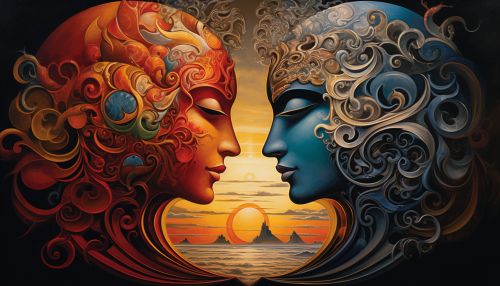Dualism
Philosophy
Dualism in philosophy refers to the theory that the mental and the physical—or mind and body or mind and brain—are, in some sense, radically different kinds of thing. The term 'dualism' was originally coined to denote co-eternal binary opposition, a meaning that is preserved in metaphysical and philosophical duality discourse but has been more generalized in other usages to indicate a system which contains two essential parts.
Substance Dualism
Substance Dualism, often referred to as Cartesian dualism, is a type of dualism most famously defended by René Descartes, which states that there are two kinds of foundation: mental and physical. This philosophy states that the mental cannot exist outside of the mind and the physical cannot exist outside of the body. Substance dualism is a philosophical position compatible with most theologies which claim that immortal souls occupy an independent realm of existence distinct from that of the physical world.
Property Dualism
Property Dualism suggests that the ontological distinction lies in the differences between properties of mind and matter. Property dualism suggests that the distinction lies in the differences between properties of mind and matter (as in emergentism). It asserts that when matter is organized in the appropriate way (i.e., organized in the way that living human bodies are), mental properties emerge.


In Religion
Dualism in religion is the theological view that there are two fundamental, opposing divine forces, often identified as good and evil. This concept is found in various belief systems and conflicts with monotheistic concepts.
Zoroastrianism
In Zoroastrianism, the world is a battlefield between the god Ahura Mazda (also called Ormazd) and the malignant spirit Angra Mainyu (also called Ahriman). The final resolution of the struggle between good and evil was supposed to occur on a day of Judgement, in which all beings that have lived will be led across a bridge of fire, and those who are pure will pass safely over into the House of Song.
Gnosticism
In Gnosticism, dualism is an integral part of the narrative. The Gnostic cosmology describes the descent of the divine soul into the material world, and its goal to escape, returning to the divine, non-material realm. The material world is often depicted as being inherently evil and is ruled by a false god.
In Science
In science, particularly in physics and biology, dualism is a guiding principle that helps scientists understand and interpret the natural world.
Wave-Particle Duality
Wave-Particle Duality is a key principle of quantum mechanics. It posits that all particles exhibit both wave and particle properties. A central concept of quantum mechanics, this duality addresses the inability of classical concepts like "particle" and "wave" to fully describe the behavior of quantum-scale objects.
Mind-Body Dualism
In neuroscience, Mind-Body Dualism can refer to any of a number of views about the relationship between the mind and the body. The most common of these asserts that the mind and the body are two distinct and separate entities. This view is opposed by physicalism, which asserts that the mind and the body are not separate, but rather that the mind is the result of physical processes within the body.
